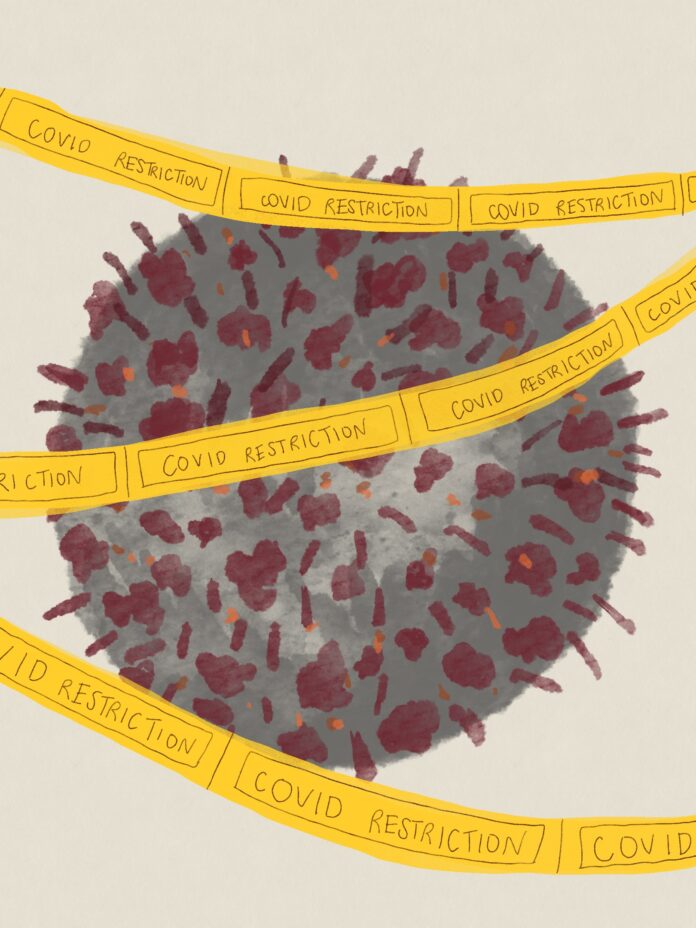On Dec. 31, University of Waterloo students living in residence received a memo from Campus Housing detailing new restrictions in response to the increasing presence of the Omicron variant across the province.
The new changes included the closure of seating spaces at the Claudette Miller Hall, Village 1 and Ron Eydt Village eateries, now open for takeout only, as well as the closure of all study and lounge spaces. Additionally, the only outside guests allowed are now limited to move-in companions.
At the start of the fall term, restrictions mostly revolved around limiting social gatherings, with capacity limits on eatery seating, gathering places like floor lounges and events. These regulations allowed UW to promote social distancing and in doing so, keep COVID numbers down.
The recent changes more closely reflect the restrictions that were in place during the spring 2021 term, where due to the province’s stay-at-home orders, classes almost exclusively took place online and both eatery dining spaces and gym facilities were also closed. As the province moved through the Roadmap to Reopen plan throughout the Spring term, these restrictions were mitigated and then lifted, only to be brought back with the rise in COVID-19 cases and the spread of the Omicron variant.
The memo took note of the fact that the new measures exceeded what was required of the university, after the Ford government’s recent announcement that the province would move back into a modified Step Two of the Roadmap to Reopen plan. Prior to the winter break, the university had notified students of a return to an online learning format until January 24. However, due to the announcement, online learning has now been extended to at least January 27 to align with the Ford government’s requirements.
The Ford government’s move back to a modified Step Two includes the reduction of social gathering limits to five people indoors and 10 people outdoors, the reduction of capacity limits to 50 percent for retail and personal care services and the closure of indoor dining as well as gyms and theatres. It also mandates the closing of indoor meeting and event spaces.
The changes are slated to be in place for 21 days.
Leyla Koc, a 1B arts and business student living on campus, pointed out the perceived gaps in logic when it came to closures of common areas like lounges. “[Lounges being closed] makes no sense because these are the people we share a bathroom with,” she said, also noting that many students end up congregating in student dorms regardless of restrictions.
Another student living on campus, 1B science student Andrea Zecca, addressed issues that can inadvertently rise as a result of sweeping changes that do not take into account individual discrepancies in housing arrangements. “I think that [the restrictions] are unfair because there are important things people need access to… my friend in V1’s lounge is connected to his kitchen, so he can’t do his dishes. They’ve basically trapped us in our rooms.”
During the past month, the province, and subsequently, the Kitchener-Waterloo region, has undergone several adjustments in terms of restrictions placed on gatherings and capacity limits. Despite having moved into Step Three early due to vaccination rates hitting target levels earlier than expected, the alarmingly high transmissibility rate of Omicron, which helped it become the most prominent variant of COVID-19, forced the province to move backwards in the Roadmap to Reopen plan.
Despite the general displeasure with the new restrictions, administrators in the Kitchener-Waterloo Region have repeatedly emphasized the importance of residents continuing to follow the restrictions and remaining alert to prevent further spread of Omicron. At a briefing on Dec. 31, chief administrator Bruce Lauckner stated that “We are asking yet again for everyone to do their part, and I know that’s a tough message to deliver.”
The message was underscored in an emergency council meeting held on Jan. 4, where Dr. Hsiu-Li Wang, Waterloo’s medical officer of health, stated that due to surging case numbers, “Even if only one per cent of those who are infected require hospital care, the sheer number of those is projected to overwhelm the healthcare system in January.”
The Campus Housing memo also included COVID-related resources for students, including a COVID test booking form (however, the form is not currently accepting submissions) as well as a health and safety guide regarding disclosure protocols.
As of Jan. 4, there are 51 people hospitalized for COVID-19 in the KW region, with 487 new cases and a total of 3,864 active cases. Those who are eligible are encouraged to get their first, second or booster shots and can visit provincial booking sites, regional booking sites or look into participating pharmacies.
































